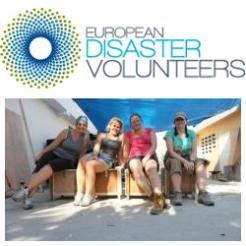Back from serving in Haiti after the devastating 2010 earthquake, Andrew Chaggar's mind is focused on developing European Disaster Volunteers from an organisation of solid response volunteers, to one which is also capable of managing its substantial growth.
It’s been seven weeks since our charity withdrew international volunteers from Port-au-Prince. Now, with our Christmas appeal and post-Haiti reporting completed, we’ve turned our attention towards our own organisational development and sustainability.
In the 20 months since we launched operations in Haiti, our income has increased by a factor of eight. While this is obviously a good thing it also means we’re in danger of outgrowing our capacity. As a result we need to make “back-end” updates in many areas, including fundamental ones like financial tracking and governance. Without these updates we’re unlikely to be able to continue managing our work effectively.
While we’ve grown significantly as a charity, we’re still not quite in a financial position where we can hire either staff or external consultants to help. Much of our growth has come in the form of restricted project funding leaving less available for internal capacity building than our increased income would suggest.
While funding is available for organisational development, accessing it takes time, skills and experience that may be lacking. Hiring a professional fundraiser is of course one solution but this in itself takes money to begin with. Also, donors who want to fund organisational development will want to be assured that their money will build on solid foundations, so a certain level of overall capacity needs to be established in the first place. This leaves us with “the chicken and the egg” situation that I’m sure many other charities find themselves facing.
So, what happens if you are an organisation, like us, that was founded by individuals with lots of operational experience and drive but limited money or exposure to organisational development? How do you then build your capacity to reach the tipping point necessary to start accessing professional services and bigger funding pools?
In the UK, when looking to develop your charity’s capacity a good source of help is often your local Council for Voluntary Service (CVS) organisation. In our hometown this is “Voluntary Action Leicestershire” which provides a very useful group support service. The issue for our charity however is that its remit and primary expertise lies in the local arena. So, until a “Voluntary Action International” exists this type of organisation can offer limited practical support to groups that operate internationally.
Thankfully though there are also other organisations out there that offer help.
One such group that is currently proving highly useful to us is the Cranfield Trust. Through its own staff and a network volunteer professionals the trust provides free management consultancy and HR services to other charities. It's already provided us with an experienced volunteer who is guiding us through the process of creating a formal business plan and over the coming months we’ll also work together to improve our financial management systems.
There are also organisations you can turn to for more targeted support. For example, the appropriately named “Pimp My Cause” provides free professional marketing help. Although relatively new themselves, they support all types of good causes - not just registered charities. In our case they were able to quickly connect us with a volunteer marketing professional whose experience proved invaluable during our Christmas appeal and who remains involved with us moving forward.
Another group recently recommended to us is the national ProHelp network. While we’ve not yet tried them we’re interested to see how their services might complement the support we’re receiving from the previous groups.
Our goal as a charity over the coming months is to become a stronger, more sustainable organisation. While this is still going to be a challenging task it’s certainly a lot less daunting being able to access these services.
In the months ahead I’ll share some of the issues we encounter as we refine and restructure our organisation to become more robust and better serve our stakeholders. I hope you’ll come back to see how we’re getting on.








